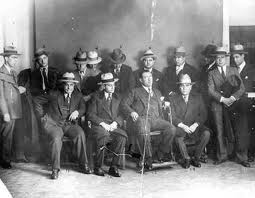 The American Mafia, an Italian-American organized crime network, rose to power through its success in bootlegging/illicit liquor trade during the Prohibition era. After alcohol became legalized again, the Mafia moved to other criminal ventures (drug trafficking, illegal gambling, infiltrating legitimate corporations). Towards the end of the 20th century, the government used anti-racketeering laws to convict Mafia members and weaken the network. However, the Mafia, though it operates with less power and notoriety than it did in earlier decades, still operates and thrives today.
The American Mafia, an Italian-American organized crime network, rose to power through its success in bootlegging/illicit liquor trade during the Prohibition era. After alcohol became legalized again, the Mafia moved to other criminal ventures (drug trafficking, illegal gambling, infiltrating legitimate corporations). Towards the end of the 20th century, the government used anti-racketeering laws to convict Mafia members and weaken the network. However, the Mafia, though it operates with less power and notoriety than it did in earlier decades, still operates and thrives today.During the late 19th and 20th century, an influx of Italians emigrated to the United States in pursuit of the American Dream with hopes of better economic opportunities. In New York City alone, the number of Italians jumped from 20,000 to 250,000 in the years between 1880 and 1890, by 1910, this number had doubled to 500,000 (one tenth of the city's population). Some of these immigrants were criminals who formed neighborhood gangs, preying on their own communities.
During the Prohibition era in the 1920s, Italian American gangs (along with other ethnic gangs) entered the increasingly lucrative bootlegging business, transforming themselves into criminal enterprises--they were extremely skilled at smuggling, money laundering, and bribing the police and other authoritative officials.
In the late 1920s, a power struggle known as the Castellammarese War broke out between the two biggest and most powerful Italian American gangs. In the end, Sicilian born crime boss Salvatore Maranzano came out on top and declared himself the "boss of all bosses". This angered another crime boss, Lucky Luciano, who had him murdered that same year. Luciano formed a central organization called the Commission to serve as a national board of directors for the American Mafia, which, at this point, consisted of 20 crime families across the country. The Commission's role was to set policies and mediate disagreements between the families.

Typically, each crime family was organized around a hierarchy which was headed by a boss who ruled with steadfast authority and received a cut of every money-making operation taken on by a member of the family. Under the boss, was the underboss who was second-in-command, below him, were the capos or captains who each controlled 10 to 20 soldiers (who had been inducted into the family). At the bottom of the chain, were associates who did business with the family but weren't full-fledged members.
Becoming a member of the Mafia included an initiation ceremony (the person coming into the family would perform rituals like pricking his finger or holding a burning picture of a patron saint while taking an oath of loyalty). Italian heritage was a prerequisite for every inductee, and, often times, men had to murder someone in order to join the family. Becoming a member was meant to be a lifelong commitment and each Mafiosi had to swear to an oath of loyalty and silence.
In 1970, Congress passed the Racketeer Influenced and Corrupt Organizations (RICO) Act, which allowed prosecutors to go after crime families and their sources of revenue, whether legal or illegal, and acted as an extremely important tool in weakening the great strength of the Mafia. Also, Mafia membership declined as Italian-American neighborhoods, previously an integral part in Mafia recruitment, underwent demographic shift and became more assimilated into society.
By the beginning of the 21st century, the American Mafia was largely weakened and only a shadow of its formerly powerful self, however it still existed and remained active in some of its traditional ventures. Part of what may have contributed to the continued success of the Mafia, could be the 9/11 attacks which shifted federal spending from organized crime investigation to counter-terrorism work.
Great job on this blog post! It seems to be well researched. I find it interesting how the mafia, which consists of immigrants, is able to become a dominant force in the American society. Now, I'm wondering about television and Hollywood's influence on the mafia. Considering movies such as Goodfellas or the Godfather or the TV show the Sopranos, do you think that the portrayal of mafias as entertainment is harmful?
ReplyDelete